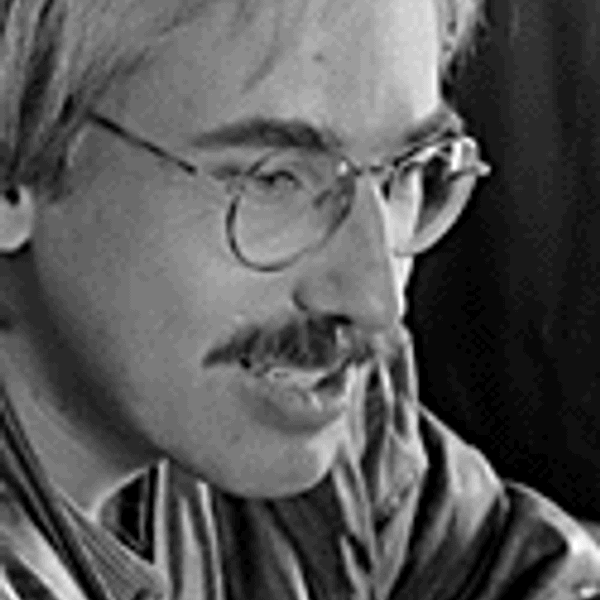Art by Jin Suk
Ed Hogan: In Memoriam
The last time I saw Ed Hogan, founding editor of Aspect Magazine and Zephyr Press, was in June for a huge Sunday breakfast at the Somerville Diner, mere blocks from the house where he was born, and five months before he was to drown in a canoeing accident in Maine.
It was a neighborhood of triple-deckers, wire fences, and closely packed buildings. The food was “good,” the lines for a booth were long, and we chose to sit at the counter. We both ordered pancakes, bacon, homefries. Ed was tall and thin; he ate like a fat man. But he biked everywhere, sometimes riding the same three-speed he used commuting to Northeastern University more than twenty years before. Our conversation that morning was typically wide-ranging. Ed loved to talk—he had enormous affection for his friends and he loved remembering them almost as much as he relished rehearsing, in indefatigable detail, his latest Zephyr project.
Ed was one of the first people I came to know after moving to Boston in 1976. He was also one of the most helpful. He treated all of us out-of-towners with respect and patience. He introduced me to people; he typeset Agni. We often talked about collaborating together on some project. For a while it looked like Zephyr might publish our 20th anniversary anthology, but then a grant didn’t come through. We laughed a lot at the strange business we were in. When we began our work as “literary publishers,” small was still considered beautiful. Small was a destination, not a designation. You began small and you stayed small because then you could be personally involved in everything that had your name behind it. Small presses were intentionally alternative—now many small publishing houses seem like New York wannabes. Which is not necessarily a bad thing; it depends. Certainly, after twenty years, we were both tired of explaining to people why we stayed with it. Debt plagued Ed and Zephyr: he knew he was playing a game in which he competed with the trust fund set. Yet his achievements were remarkable. Not only was his collected Akhmatova a triumph, selected by the New York Times as one of the best books of the year, but his Ukrainian anthology From Three Worlds was an equally important first which has won him an appreciative and loyal following on both sides of the Atlantic. During our three years of work on it, I was repeatedly moved by Ed’s determination. Despite considerable obstacles, he wanted to see the project through to its end. Here again his success can be measured: at his death, the anthology was about to go into a second edition. Ed was in fact one of the heroes of American small press publishing, earning a place for himself alongside the likes of Harriet Monroe, Lawrence Ferlinghetti, George Hitchcock, and Sylvia Beach. I’m pleased to announce the creation of the Ed Hogan Award, which will be given annually to a small press editor for excellence in publishing.
After breakfast, Ed made me walk over to his car so I could admire the shiny new red canoe still strapped to the top.
pictured: Ed Hogan (right), Askold Melnyczuk (center)
photo courtesy of Marie Aronson

Askold Melnyczuk
Askold Melnyczuk—the founding editor of AGNI, for which he received the PEN/Nora Magid Award for Magazine Editing—is the author of four novels and a book of stories. What Is Told (Faber, 1994), was the first commercially published work of fiction in English to highlight the Ukrainian refugee experience and was named a New York Times Notable. Other novels have been selected as a Los Angeles Times Best Book of the Year and an Editor’s Choice by the American Library Association’s Booklist. His most recent book is a collection of stories, The Man Who Would Not Bow. His selected poems, The Venus of Odesa, is forthcoming from Mad Hat in summer 2025. A book of selected nonfiction, With Madonna in Kyiv: Why Literature Still Matters (More than Ever), will be published by Harvard University Press in 2026. He has edited a book of essays on the St. Lucian Nobel Prize–winning poet Derek Walcott and is coeditor of From Three Worlds, an anthology of Ukrainian writers from the 1980s generation. He’s the recipient of a Lila Wallace-Reader’s Digest Writers Award for fiction, the Heldt Prize for translation, and the George Garret Award from AWP for his work in the literary community. Individual poems, stories, essays, and translations have appeared in The New Yorker, The Paris Review, The Gettysburg Review, The Missouri Review, and elsewhere. Also the founder of Arrowsmith Press, he has taught at Boston University, Harvard, and Bennington College and currently teaches at the University of Massachusetts Boston. (updated 5/2025)

